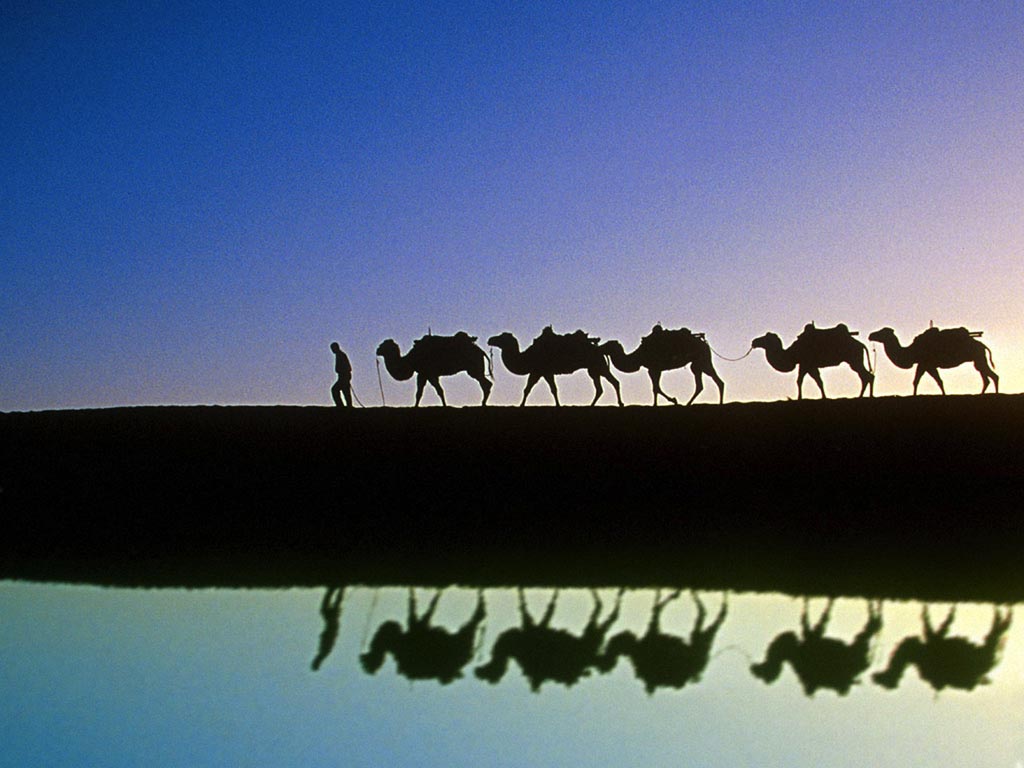
RAAAAAAAAMMMAAADHHAAAAANNNN MUBARAAAAAAAAKKKKK
RAAAAAAAAMMMAAADHHAAAAANNNN MUBARAAAAAAAAKKKKK
RAAAAAAAAMMMAAADHHAAAAANNNN MUBARAAAAAAAAKKKKK
Have you ever heard of a weekend warrior? They are employees who sit in cubicles or relax at a coffee station, weighed down with donuts and muffins all week long. Then, during weekends they rip off their suits bearing their Reebok gear underneath and spend the entire weekend playing basketball, hang gliding, or mountain climbing. What happens? They break their knees, pull a dozen muscles, and are hospitalized on Monday.
This is in relation to the physical body. But there are people that should be known as Ramadan warriors. They are those who haven't fasted all year long and then suddenly shock their bodies for a whole month. Or haven't prayed in the Masjid or haven't woken up to pray during the night all year long. What happens to them? As one Muslim physician said, "On normal days, we have about 5 - 7 patients a day, but on the first day of Ramadan, patients increase to over 50!"
Ramadan warriors were rare in our Islamic history. To illustrate, let's all remember where we were at the beginning of the month of Safar - corresponding this year to the second week of May. We were probably praying for work to end, or just finished up with exams, or looking through brochures for a holiday getaway.
Interestingly, if we were sitting beside a taabi'ee over a thousand years ago in a simple Masjid, we would have heard him raising his hands asking Allah to grant him the blessing of being around when a guest comes, a guest called Ramadan!
Ramadan Warriors
By Muhammad Alshareef
Sahl ibn Sa'd - radi Allahu 'anhu - narrates that An-Nabee - sal Allahu alayhi wa sallam - said, "In Jannah there is a gate called Ar-Rayyan, a door which the Saa'imoon will enter from, no one else except them. It will be announced, 'Where are the Saa'imoon?' and the Saa'imoon will stand. No one except them will enter from the Rayyan gate."
Have you ever heard of a weekend warrior? They are employees who sit in cubicles and relax at a coffee station weighed down with donuts all week long. Then on the weekend they rip off their suits bearing their Reebok gear underneath and spend the entire weekend playing basketball, hang gliding, and mountain climbing. What happens? They break their knees, pull a dozen muscles, and are hospitalized on Monday.
This is in relation to the physical body. But there are people that should be known as Ramadan warriors. They are those that haven't fasted all year long and then shock their bodies with a whole month. Or haven't prayed in the Masjid or haven't woken up to pray in the night all year long. What happens to them? As one Muslim doctor said, "In normal days, we have about 5 - 7 patients a day. On the first day of Ramadan,the patients increase to over 50!"
Ramadan warriors were rare in our Islamic history. To illustrate, let's all remember where we were at the beginning of Safar - corresponding this year to the second week of May. We were probably praying for work to end, or just finished up with exams, or looking through brochures for a holiday getaway.
Interestingly, if we were sitting beside a taabi'ee over a thousand years ago in a simple Masjid, we would have heard him raising his hands asking Allah to grant him the blessing of being around when a guest comes, a guest called Ramadan!
There are different ways that we can 'warm up' for Ramadan. One of those ways is by increasing the frequency of our Du'a:
Allah ta'ala says in the Qur'an ... the verse before it is talking about Ramadan and the verse after it is speaking about Ramadan, and right in the middle we read: [And when My servants ask you, (O Muhammad), concerning Me - Indeed I am near. I respond to the invocation of the supplicant when he calls upon Me. So let them respond to Me (by obedience) and believe in Me that they may be guided.]
- Surah Al Baqarah 2/186
Every goodness on earth is from Allah. And one of the most exclusive blessings is Ramadan. So let us ask the Lord of Ramadan to help us find His Mercy in the coming days.
Last year, we gave a khutbah here on Hajj entitled 'The Call of Ibraheem'. A brother just a few weeks ago told me that during that Khutbah he raised his hands to Allah and asked Allah to find him a way to make Hajj. He said that he had no money to make the trip, but that night more then one brother approached him with the offer, "Brother we have a Hajj program for new Muslims, would you like to come!"
Alhamdulillah, that brother made Hajj last year from a Du'a that came straight from the heart - in sha' Allah.
The early generations of the Ummah used to make Du'a 6 months after Ramadan that Allah accept their deeds in Ramadan. And for the next 6 months, they would make du'a to Allah to grant them the blessing of being alive in the coming Ramadan.
Cleanliness - Whenever a guest comes, we prepare in advance for his arrival by vacuuming the carpet, dusting the shelves, and scrubbing the sinks. We should do this for our guest called Ramadan. But the scrubbing should not just be of our physical surroundings, it should include the scrubbing of our sins.
Listen to the words of an-Nabee - sal Allahu alayhi wa sallam - speaking about those people that don't want to clean up for Ramadan, "Whoever doesn't desist from speaking falsehood and acting upon it, Allah has no need that he desist from his food and drink." - Bukhari
Fasting in Sha'baan (this Month that we are now in) - The biggest downfall of the weekend warriors was that they were not properly warmed up for the exercise which caused the injuries. Similarily, when Fasting, some people only do it once a year making their bodies very foreign to going without food and drink.
From here we see the following Sunnah: Umm Al-Mu'mineen Aisha - radiAllahu 'anha - observes, "Allah's Messenger never fasted an entire month other than Ramadan and I haven't seen him fast more than he did in Sha'baan."
A poet said: Oh ye who isn't satisfied with his sins in Rajab / so much so that you continued disobedience in Sha'baan / The month of fasting has now come upon you / so do not convert it also to a month of disobedience.
When we look at the celebrations, 'the holy days' of this country, we see that they put all their time and effort and spirit in preparation. I tell you, go to any store outside this Masjid and you will see preparations of Candy Canes, red and green bouquets, even Eggnog all in the wait for the annual celebration of the birth - as they falsely claim- of Prophet 'Esa (alayhis salam.) They are preparing for their falsehood almost 2 months in advance! One of the ways to prepare for Ramadan is to educate ourselves in the Fiqh of Ramadan. Alhamdulillah - sitting in this Masjid today are many brothers and sisters for whom this will be their first Ramadan. Allahu Akbar! May Allah accept it from them and allow them and us to share in the blessing of Ramadan for many years to come. Let us briefly review what fasting is:
Fasting Ramadan is not optional - it is a must. The evidence for this is found in the Qur'aan and Sunnah. Allaah says (interpretation of the meaning):
"O you who believe! Observing al-sawn (the fasting) is prescribed for you as it was prescribed for those before you, that you may become al-muttaqoon (the pious)." [al-Baqarah 2:183]
The Prophet said: "Islam is built on five [pillars]..." among which he mentioned fasting in Ramadaan. - Bukhari
The Arabic word for fasting is Sawm. In Arabic it literally means to abstain from something. And in Islamic Law it is to abstain from those things that break the fast starting from dawn (Fajr Prayer) and ending with sunset (Maghrib prayer) having first made the intention to do so.
The things which break ones Fast, the things which he or she must abstain from from dawn to sunset are as follows:
(a) Eating and Drinking
(b) Marital Relations
These apply if 3 conditions are met (1) That the person is not ignorant that this thing breaks ones fast (2) That he is aware that he is doing something that breaks his fast (meaning he did not do so in forgetfulness) (3) He does so out of his free will and no one forced him to break his fast.
In conclusion, as the month of Ramadan draws nearer, we should prepare for this special guest by preparing a Ramadan program *Operation: Valuable Time* in our homes and at our Masjids. The program should in sha' Allah include:
1. Locked times of the day when we will consistently recite Qur'an, learning it's meanings and memorizing new Sur'ahs.
2. Something useful for the time before Taraweeh prayers and the time after Taraweeh. And how to increase our worship in the last ten nights - i.e. what will we do extra.
3. We should make sure that there are days of this month when we feed people. Bring dates or milk to the Masjid for Maghrib. Invite people over to have dinner with your family. Organize a dinner in the Masjid and invite people that don't normally get invited because they are new. Take care of the New Muslims in your community and for the sake of Allah ta'ala make their Ramadan special.
4. Make the intention to double and triple the amount of Sadaqah we give, the worship we normally do, the Dhikr we do, and the deeds that'll help us purify our souls, etc.
And finally, for those that can afford it plan a Umrah to the Ka'bah in Ramadan!
After returning from the farewell Hajj, Rasul Allah - sal Allahu alayhi wa sallam - saw an Ansari women who had not made the Hajj. He asked her, "What kept you back from joining in the Hajj?" She said, "We had a camel that we used to ride which Abu Fulan and his son went on, and another we used for farming." So Rasul Allah - sal Allahu alayhi wa sallam - said, "Verily, Umrah in Ramadan is the same (reward) as performing Hajj with me!" - Bukhari and Muslim







